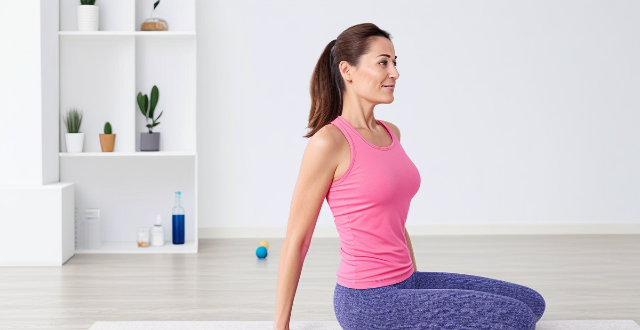Pain Health

How does the idea of 'no pain, no gain' affect people's approach to exercise ?
The "no pain, no gain" philosophy significantly influences people's attitudes toward exercise. While it can boost motivation and discipline, it also poses risks like injuries and overtraining. This mindset may lead to a narrow focus on immediate results, potentially neglecting long-term health goals. It can also negatively affect mental health by causing stress and burnout. Adopting a balanced approach that emphasizes enjoyment, gradual progression, and self-awareness can help achieve fitness goals sustainably without the drawbacks associated with "no pain, no gain."

What should I do if I experience pain during exercise ?
Pain during exercise can be a sign of injury or overexertion. To prevent and manage pain, it is important to warm-up properly, stretch regularly, pay attention to your body's signals, incorporate cross-training, take breaks, drink plenty of water, use proper form, rest and recover, and seek medical advice if necessary. By following these steps, you can reduce the risk of injury and improve your overall fitness.

Is it true that exercise can help manage chronic pain conditions ?
Exercise can help manage chronic pain conditions by reducing pain intensity, improving physical function, enhancing quality of life, and increasing energy levels. It is important to consult with a healthcare professional before starting any exercise program and to start slowly, gradually increasing intensity over time while listening to your body's responses.

In what ways does mental health support impact overall women's health ?
This text discusses the importance of mental health support for women's overall health, highlighting its impact on physical health, emotional well-being, relationships, and work performance. It emphasizes that good mental health can reduce the risk of chronic diseases, improve sleep quality, and help manage pain. Additionally, it mentions how mental health support can enhance emotional well-being by reducing stress, improving mood, and increasing resilience. The text also points out that mental health support can strengthen relationships through improved communication, better emotional regulation, and greater empathy. Lastly, it notes that mental health support can enhance work performance by improving focus, reducing absenteeism, and increasing job satisfaction.

How can I prevent back pain from sitting all day at work ?
Sitting for prolonged periods can lead to back pain, especially if you have a sedentary job. However, there are several ways to prevent back pain from sitting all day at work: 1. Maintain good posture by sitting up straight and adjusting your chair height. Use a footrest if needed and keep your elbows close to your body. 2. Take short breaks every hour to stand up, walk around, and stretch your muscles. Perform desk exercises and stretch regularly to reduce tension. 3. Use ergonomic furniture such as an adjustable chair with lumbar support and an adjustable desk that allows you to alternate between sitting and standing. Place a supportive mat under your chair for additional cushioning and support. 4. Strengthen your core muscles through core exercises, yoga or Pilates, and abdominal exercises like crunches and planks. 5. Practice good habits outside of work by maintaining an active lifestyle, paying attention to your sleeping position, and avoiding heavy lifting.

How does exercise contribute to bone health ?
Exercise contributes to bone health by increasing bone density, improving balance and coordination, strengthening muscles, improving posture, reducing inflammation, and enhancing cardiovascular health. This reduces the risk of osteoporosis, fractures, back pain, and other health issues.

What exercises are beneficial for women's health ?
Regular physical activity is crucial for women's health, preventing chronic diseases, improving mental health, and boosting self-esteem. Aerobic exercises like running, swimming, and cycling are great for cardiovascular health and weight management. Strength training exercises such as weightlifting, resistance bands, and bodyweight exercises can improve bone density and reduce the risk of osteoporosis. Yoga helps to improve flexibility, reduce stress, and enhance mental clarity, while Pilates focuses on core strength, flexibility, and balance. Incorporating these exercises into a fitness routine can lead to improved cardiovascular health, stronger bones and muscles, reduced stress levels, and enhanced overall well-being.

What is the importance of mental health in global health initiatives ?
This document discusses the importance of mental health in global health initiatives. It explains why mental health matters and how it affects physical health, economic stability, and social outcomes. The document also discusses how mental health affects global health initiatives and emphasizes the need for culturally sensitive approaches to address mental health issues sustainably.

How does a sedentary lifestyle affect job productivity and overall health ?
This article discusses the negative impacts of a sedentary lifestyle on job productivity and overall health. It outlines how prolonged periods of sitting can lead to decreased energy levels, impaired cognitive function, and increased stress and anxiety in the workplace. It also highlights the increased risk of chronic diseases such as heart disease, diabetes, and obesity, as well as musculoskeletal issues and poor mental health associated with a sedentary lifestyle. The article concludes by emphasizing the importance of incorporating regular physical activity into daily routines and maintaining a healthy work-life balance to improve job performance and overall well-being.

Is weight-bearing exercise really necessary for bone health ?
Weight-bearing exercises are often recommended for maintaining bone health, but is it really necessary? Let's explore this topic in detail. Weight-bearing exercises include any activity that requires you to carry your own body weight, such as walking, jogging, dancing, climbing stairs, and weightlifting. These exercises can help strengthen bones and muscles, improve balance and coordination, and reduce the risk of falls. Maintaining healthy bones is crucial for overall health and well-being. Strong bones provide support and protection for your body, allowing you to move with ease and perform daily activities without pain or discomfort. Additionally, having strong bones can help prevent fractures and other injuries. Weight-bearing exercises have numerous benefits on bone health, including stimulating bone growth, improving bone density, reducing the risk of falls and injuries, and promoting overall health and well-being. However, there are some alternatives to weight-bearing exercise that may be beneficial for people who cannot engage in these types of activities. These include resistance training, yoga or Pilates, and swimming. In conclusion, weight-bearing exercises are highly recommended for maintaining bone health due to their numerous benefits on bone growth, density, and overall health and well-being. However, there are alternative exercises that may be beneficial for people who cannot engage in weight-bearing activities. It's always best to consult with a healthcare professional before starting any new exercise program.

Are there specific exercises that help improve mental health ?
Exercises like yoga, meditation, aerobic exercise, resistance training, MBSR, and Tai Chi can help improve mental health by reducing stress, anxiety, and depression symptoms while promoting relaxation, self-awareness, and social interaction.